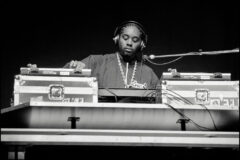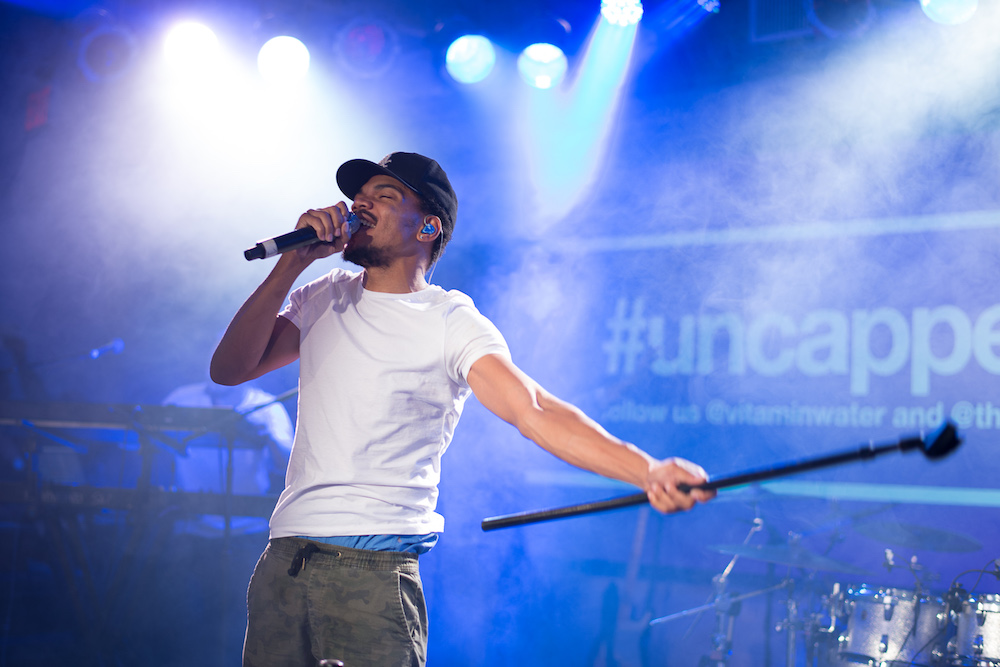There’s a point where the leathers are so Italian, the bank accounts balloon so big, and the sheets’ thread count run so high that they’re no longer signifiers of wealth. They’re curses. Hip-hop affluenza afflicts those who know they can never have enough and that they can someday lose the riches they already have — it’s a condition that catches you somewhere between King Midas and Ozymandias.
Suffering from success has been a thing way before DJ Khaled made it an album title in 2013; Diddy & Co. sobbed in their shiny suits first. But DJ Khaled kicked the phrase and turned his Snapchat into a never-ending victory lap, and, in 2016, high-profile artists are still forming entire hip-hop blockbusters around the oxymoronic idea that fame is the worst thing to happen to them. In fact, it’s a focal point of two of the year’s biggest albums: Kanye West’s The Life of Pablo and Drake’s Views. Both are bested, though, by a much smaller release, Chance the Rapper’s Coloring Book, which veers into sunnier pathways, trading “suffering from” for “flourishing in.”
But before we get to that, let’s look at the heavy-lies-the-crown set. Kanye and Drake both released remarkable albums examining the allure and pitfalls of success years ago. My Beautiful Dark Twisted Fantasy is a classic, and while Take Care hasn’t received quite the same unanimous praise, some have placed it in the pantheon of modern hip-hop. But their latest offerings are more reductive than revolutionary.
Views is an 80-minute, corporation-backed pout. More so than before, the cheers are soured bits of self-aggrandizing (“You platinum like wrappers on Hershey’s / Boy, that s**t is worthless,” on “Weston Road Flows”), the self-pity is comically alienating (“Dry cry ’cause I’m hopeless,” on “With You”), and the emotion gives way to junior high-level pickup lines (“You treat me like I’m born yesterday, you forgot my birthday,” again on “Weston Road Flows”). Views is Drake doubling down on his brand — turning clandestine confessions into mantras — and it’s a slog, especially when his commercial contemporaries are out here taking risks.

Also Read
GEAR THAT MADE THE GAME: Rap Machinery
‘Ye is still pushing some boundaries and The Life of Pablo features moments that rate among his finest: The slick autobiographical prose on “No More Parties in L.A.” and the weepy “Real Friends” are among the year’s best tracks. But look at what we have to go through to get there: West dropping the ball after Metro Boomin’s own signature drop by talking about bleached assholes and an extended rant about f**king at a Vogue party (“Freestyle 4”). “No More Parties in L.A.” comes wedged between a piss-poor sandwich metaphor (“Wolves”) and Post Malone (“Fade”). TLOP is far superior to Views, but they’re alike in how their leading man is too often the weakest link. Whatever worldview West has from his elevated tax bracket is refracted into a series of tabloid raps and hackneyed expressions of id.
The only thing the droll GoPro/amateur sex bars (“Highlights”) have going for them is how they’re coming from Kanye West’s bass-deficient voice, just like how Drake’s alligator tears only matter because they’re his (or his ghostwriter’s). Bleeding out on records has become both rappers’ default. Yes, hip-hop has had plenty of artists making emotional music, but the genre is still, by and large, hyper-masculine. West and Drake are the only two rappers to make vulnerability central to their persona while achieving such a high level of sustained commercial success. And because living vicariously comes with listening to hip-hop, being open and being human will always have an appeal — it helps cut through the materialistic excess, and connects the listener to the artist.
What drags West and Drake down isn’t simply that they’re suffering from success — it’s how they now rarely reach beyond hubris to express themselves (although I’d be remiss to not mention the inclusive beauty of “Ultralight Beam,” even though it’s Chance who steals the show). All these years past 2009’s So Far Gone and Drake’s still moping somewhere between I want it and I got it; West can’t stop talking about his dick. What was once illuminating and relatable becomes redundant and alienating.
Chance’s Coloring Book does limit itself musically by using gospel as a creative crutch. But it is a religiously caked project that’s ostensibly about change — where we’ve been and where we are. It’s a polychromatic look at good fortune. Problems persists (the pesky labels on “No Problem,” the murderous Chicago summers on “Summer Friends”), but the reasons to celebrate grow. This is Chance’s career-making mixtape, yet he opens it with homage and praise for two of the most important women of his life: “Man, my daughter couldn’t have a better mother / If she ever find another, he better love her.” This sort of positivity feels even more refreshing next to the dour 2016 event albums that preceded it.
Money doesn’t solve every problem. And it would feel disingenuous if every hip-hop triumph was packaged with nothing but hosannas. The issue is when the throes and the woes — brooding atop premium cotton sheets, frowning while rested on bosoms, anguished behind tinted windows — start to feel rehashed and become echoes that ring out hollower and hollower. Success isn’t easy, but life doesn’t have to be so damn hard.
https://youtube.com/watch?v=uZyt5dSNcFo




